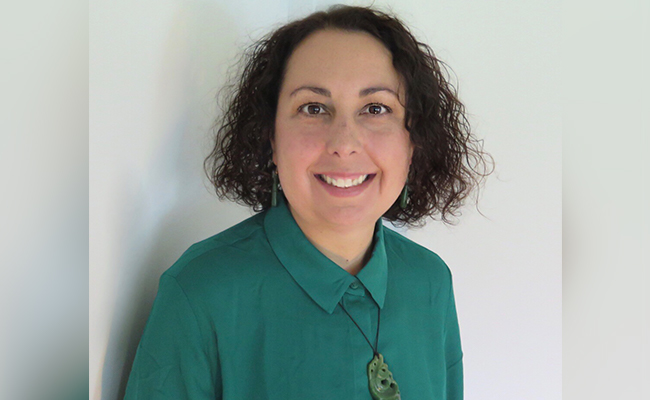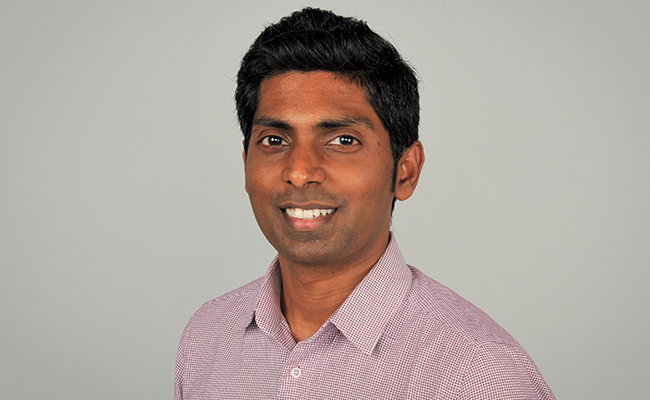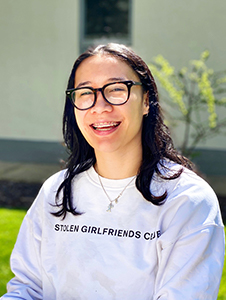
Clinical Neuropsychologist Sarah Goldsbury has received $260,000 of funding from the Health Research Council.
Clinical Neuropsychologist and solo parent Sarah Goldsbury is proud she can provide her son with a strong role model and develop her work as a Māori researcher by completing her PhD research on Fetal Alcohol Spectrum Disorder.
Ms Goldsbury (Ngāti Porou me Te Aitanga-a-Hauiti) has received a Clinical Research Training Fellowship worth $260,000 to carry out research on Māori whānau experiences of neuropsychological assessment for Fetal Alcohol Spectrum Disorder (FASD).
She is one of one of 10 University of Otago researchers carrying out Māori-specific research, who have received an HRC career development award or health delivery research award.
Returning to university after a 16-year absence while working full time as a clinician and raising her teenage son is no small task, she says.
"I would never be able to go back to university and complete a PhD while paying the mortgage and putting food on the table without the support of this fellowship from the HRC, and I am very, very grateful and appreciative for this."
“While it is a busy life, to me it is important to try and be a role model to my boy,” she says.
“He is just finishing Year 9 at school and looking to the future, and I want him to see it is achievable and realistic to engage in tertiary education and to work towards a PhD, that being prepared to work hard can get you places and make a difference in our community.
“I would never be able to go back to university and complete a PhD while paying the mortgage and putting food on the table without the support of this fellowship from the HRC, and I am very, very grateful and appreciative for this,” she says.
Ms Goldsbury is based in Tairāwhiti/Gisborne but travels throughout the country to carry out the neuropsychological component of FASD assessments for children and youth in temporary and permanent care and Youth Court.
She is grateful to have been gifted the privilege of being supervised by Otago Professor Suzanne Pitama as part of the university's Māori/Indigenous Health Institute in Christchurch.
“Professor Pitama is someone who is an aspiration and a role model, and I am excited to be shaped by her in my PhD pathway.”
In her work as a clinician, Ms Goldsbury sees some of the tamariki and rangatahi with the highest and most complex presentations of FASD, and sadly, too many are Māori.
“FASD is a complex disability that many do not understand well. There is a clear lack of systemic supports in Aotearoa to both identify and support those with FASD.
“I believe we have an epidemic of FASD in Aotearoa which is largely invisible to many professionals and whanau who do not recognise what they are seeing. And not only are we ignoring this, but we are inadvertently judging and punishing those who have FASD, and their whānau trying to support them on a daily basis.”
Those with FASD are at risk of issues such as secondary mental health problems, trouble with the law, inappropriate sexual behaviour, alcohol and drug use, and are some of the most vulnerable members of the community, Ms Goldsbury says.
The intentional dismantling of traditional Māori society has placed Māori at much greater risk for prenatal exposure and subsequent FASD – with recent research showing 80 per cent of children presenting to one assessment centre were Māori.
Her research will actively seek to integrate a Māori world view in a traditionally Western assessment process, with an aim to be representative and inclusive of whānau Māori.
“I believe we do a disservice to Maōri when they are not able to access the benefits of a neuropsychological assessment, yet we also do a disservice when we use psychometric tests which are based in a Western perspective and normed overseas if we do not change our processes or how we utilise the tests.”
Ms Goldsbury aspires for Aotearoa New Zealand to develop its own bicultural FASD Assessment Guidelines, instead of relying on overseas models.
“This would be a world-first in the FASD field and I hope this will lead to support being gathered for other countries to consider the appropriateness of FASD assessment protocols for their own Indigenous communities.”
More than $3.3 million has been awarded to the University of Otago to further work in areas ranging from diabetes and stroke, to mental health.
Deputy Vice-Chancellor (Research and Enterprise) Professor Richard Blaikie says the University is grateful for the funding, which will support the career development of “bright and ambitious researchers”.
“Not only will the research itself lead to important advances in healthcare and well-being, but the projects will allow many of the recipients to advance successfully to the next stage of their careers.”
Māori-related research funded by the HRC
2021 HRC Career Development Awards (general)
Clinical Research Training Fellowship
Ms Sarah Goldsbury, University of Otago, Christchurch
Māori whānau experiences of neuropsychological assessment for FASD
36 months, $260,000
I am a Clinical Neuropsychologist of Ngāti Porou and Te-Aitanga-a-Hauiti whakapapa. I undertake the neuropsychological component of Fetal Alcohol Spectrum Disorder (FASD) assessments. I work alongside children and youth in temporary and permanent care, and through Youth Court referrals. I am one of few Māori clinicians in this field of clinical practice and research. To date, this is an emerging field of research in Aotearoa, and the impacts of institutional racism within this process and protocol have not been identified. The purpose of this research is to explore and document Māori whānau experiences of the neuropsychological processes in FASD assessment. I will utilise a Kaupapa Māori methodological approach for this qualitative study, using semi-structured interviews, and inductive thematic analysis. The findings of this study will utilise participant voices as experts to formulate how neuropsychological assessment for a diagnosis of FASD can be more responsive and acceptable to Māori whānau.
Dr Ngaire Keenan, University of Otago, Wellington
Defining Māori epilepsy burden and developing an approach for future research
24 months, $173,333
Epilepsy, the most common serious neurological disorder in childhood, affects ~4000 New Zealand children. Although children with epilepsy may live normal lives, 30 per cent have uncontrolled seizures and poor outcomes. Epilepsy is 40 per cent more common in Māori children than other ethnicities. International reports suggest that higher rates of epilepsy result from preventable causes which can be reduced with successful public health initiatives. Dr Ngaire Keenan is a Māori Paediatric Neurology trainee who plans to become a New Zealand clinician scientist. Her PhD aims to describe the syndromes, aetiologies, comorbidities and management of epilepsy in Māori children compared to non-Māori children. If the increased rate of epilepsy in Māori children is due to preventable causes, then culturally appropriate health strategies can be implemented to promote positive change. She will also develop strategies to identify epilepsy cohorts for future research which will ultimately aid her long-term career goal of improving childhood epilepsy outcomes.
2020 HRC Health Delivery Research Career Development Award

Dr Hemakumar Devan has recieved $91,689 in funding from the HRC.
Dr Hemakumar Devan, University of Otago, Wellington
Partnering with whānau to address inequities to pain management
12 months, $91,689
Chronic or persistent non-cancer pain affects one in five New Zealanders. Persistent pain disproportionately affects Māori and their whānau. Māori face significant inequities in accessing specialist pain services and experience stigma and stoicism in expressing and managing pain. Community programmes co-developed with Māori empower whānau and hapū fostering healthy behaviours. Our previous community engagement has identified the need for a kaupapa Māori (by Māori, for Māori) pain support programme that prioritises kanohi-ki-te-kanohi group-based interactions. Hosted in Capital and Coast DHB Pain Management Service, this placement will allow me to develop and deepen my own clinical skills needed to provide pain services and to lead a collaborative project with Tu Kotahi Māori Asthma and Research Trust as a clinician-researcher. The dual aims of this fellowship are to gain clinical skills in pain management and to support the co-design of a Māori pain support programme for whānau with persistent pain.
Ms Amber Young, University of Otago
Reducing immunisation inequities during pregnancy
12 months, $51,694
Influenza and pertussis (whooping cough) vaccinations are recommended for pregnant women in New Zealand because Influenza infection during pregnancy is associated with severe disease in the mother and poorer outcomes in babies (e.g. premature birth). Immunising pregnant women creates antibodies against infection that are passed to the fetus and protects the baby against disease in the first few months of life. However, Māori and Pacific women have lower rates of immunisation during pregnancy, especially in areas of high deprivation. The aim of this research is to understand what information Māori and Pacific women need to know to encourage vaccination during pregnancy, and how this information should be delivered.
2021 Māori Health Career Development Awards
Māori Health PhD Scholarship
Ms Jordon Lima, University of Otago
Equitable Application of Circulating Tumour DNA to the New Zealand Population
36 months, $141,000
Circulating tumour DNA (ctDNA) is DNA released by a tumour into the bloodstream and represents a novel class of blood marker for cancer detection. ctDNA can potentially change how cancer is diagnosed and how patients are monitored during and after treatment. Before ctDNA can be integrated into the New Zealand healthcare system, we must test the technology's clinical utility and determine its best application for reducing health inequities, particularly amongst Māori and rural communities. In this proposed PhD research, I will analyse ctDNA testing for surveillance of stage 2-3 colorectal cancer patients on the West Coast of the South Island. Māori health providers will co-design this study, which will add personalised ctDNA testing to patients post-treatment surveillance plan for approximately 1-2 years. Māori co-design and integration in this project will ensure ethical issues are identified, benefits to Māori are optimised, and tikanga is retained in future ctDNA use.
Māori Health Masters Scholarship
Mr Witana Petley, University of Otago
Experiences of Stroke Rehabilitation for Māori Stroke Survivors and their whanau
24 months, $31,600
Stroke is the second leading cause of death and disability in New Zealand with notable ethnic and socioeconomic disparities. Māori are more likely to have a stroke event compared to non-Maori and are also experiencing strokes at a younger age. Stroke survivors and their caregivers' collective experiences of stroke rehabilitation have been explored and have found positive benefits when caregivers have had active input during physical rehabilitation. However, this research has not been explored for Māori stroke survivors and their whanau members. This research will aim to identify what the current experience of stroke rehabilitation is for our Māori Stroke Survivors and their whanau members. The intention of this study is to identify what type of support will be best-suited to our Māori stroke survivors and their whanau members during their rehabilitation journey.
Māori Health Summer Studentship

Sade Gilbert-Perenise
Miss Brooke Bridges, University of Otago, Wellington
Understanding how the supportive care needs of Māori with cancer are assessed
3 months, $5,000
Ms Raiha Cook, University of Otago, Wellington
An inquiry into Raukura integration into Euro-centric Otago University
4 months, $5,000
Miss Sade Gilbert-Perenise, University of Otago, Wellington
Utilisation of Wai for the Holistic Wellbeing of Māori
3 months, $5,000
Ms Jordon Lima, University of Otago
Investigating Genetic Links between Height and Gout in Māori and Pacific people
3 months, $5,000
Ms Saskia van der Wilt, University of Otago
Physiotherapists' use of green-space for life long health conditions
2 months, $5,000
